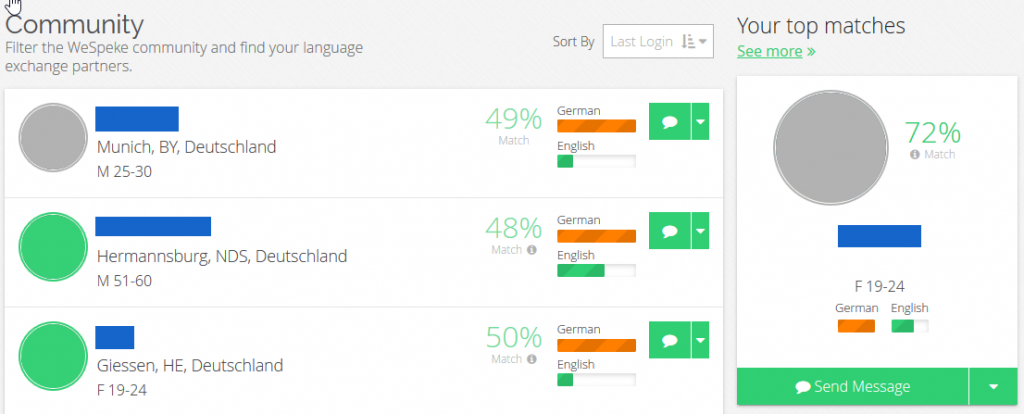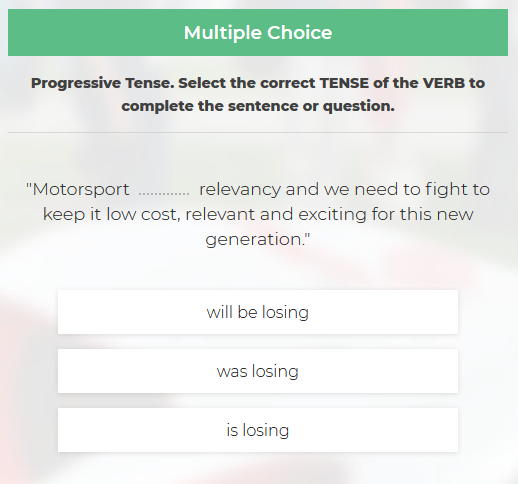Analysis of Existing Similar Tools
Why look at existing Social Network services?
When you are designing a new service to offer consumers, it is important that you do not copy someone else’s service because they can probably (and most likely already are) do it better than you can [1]. In this series of posts, we will look at a number of existing services that inhabit similar spaces to the focus of our project – such as tools to help people learn new languages and services aimed at students.
By investigating the services already on offer, we will also develop an understanding of how an online social network should be presented, what common functionality would be useful to include, and how such a system might be financed.
WeSpeke
Overview
WeSpeke is a online social network that aims to use a crowdsourcing model to help people to learn to speak a new language [2]. It is important that we research services like this, as we will be targeting students who may come from overseas and need help to feel more confident speaking the local language.
Functionality
WeSpeke separates its main functionality into two systems:
- WeSpeke Chat.
- WeSkeke Lessons.
WeSpeke Chat
The chat system is the primary focus of the crowdsourcing model. This is a system that matches users with different language experience together to allow them to learn from each other. Conversations can happen using text chat, or audio/video if you have access to a microphone or webcam, respectively.
Matching partners
When you sign up to WeSpeke, you are asked to fill out a form, describing: your language knowledge, what language you would like to learn, and what your interests are. The website then suggests a list of practice partners based on compatible language experience and shared interests.

Matches returned for Matthew’s WeSpeke profile (specifying good knowledge of English and a desire to learn German). Identifying information has been omitted for privacy.
Notebook
WeSpeke allows users to build up a digital ‘notebook’ as they use the service. This allows the user to organise useful resources, and save lists of custom phrases that they find usual. [3]
By allowing the user to customise part of the service to their liking, WeSpeke have been able to create personal investment of in the platform. Users become less willing to switch to another service because they will lose their collection of assests. [2]
Use to overseas students
WeSpeke advertise as being a useful resource for overseas students. [4] Above, we have mentioned that this is part of our target audience. They suggest talking to locals to get an understanding of how they speak, and to ask them about useful local services. You can see above that user profiles include the location of the user to help with this, however there does not seem to be a way of filtering partners by location – you can only filter by native language. This would make it quite difficult to discover users who live near the university that you will be travelling to, and is something that we should do better in our system.
WeSpeke Lessons
The service also provides a selection of lessons that users can use to test what they have learned. There are two tiers of lessons:
Free Lessons
Free lessons are automatically generated by an AI system from CNN news articles. [5] Because CNN is an English news company, these lessons are only designed to teach English. More details are included at the end of this blog post.
Matthew completed an example lesson, and discovered that the format of the lessons is as follows:
- Read a CNN article in English.
- Complete a series of questions based on salient words (nouns, adjectives, verbs) extracted from the article. These are mostly multiple-choice activities.
- Receive points based on how well you answered the questions. This is an example of Gamification, and extends to achievement badges and score leaderboards. There are extra points available for completing lessons on subsequent days, which heavily encourages repeat engagement.

An example multiple-choice question taken from a free WeSpeke lesson.
Though impressive, this system highlights the limitations of relying on AI to produce content rather than hand-crafting it:
- Some of the generated definitions for words were incorrect, because some words can have multiple meanings in English. The AI was not able to discover the correct meaning from the content. For example, the word ‘Niche’, used in the article to mean ‘a specialised interest’, was defined by the lesson as ‘a small hole/indent in a wall’.
- Additionally, the ‘incorrect’ multiple choice options were just other words taken from the article. This means that the questions are not able to offer difficult tests that check that you can understand subtle/contextual differences between similar words.
Premium lessons
Premium lessons are more involved, and include: [6]
- Vocabulary.
- Grammar.
- Audiovisual content.
- Self-tests.
- Talks with native speakers.
Business Model
Users can sign up to WeSpeke for free, and use the chat functionality immediately. The desktop site serves adverts on the users’ home pages. There is an optional monthly subscription that grants access to the collection of premium lessons for users to test their knowledge on.
References
[1] J. Stewart, ‘How does Technology Make Money?’, University of Southampton, 2018.
[2] A. Seave, “Crowdsourcing Drives Latest Disruptive Tech in Online Language Learning,” Forbes, 24-Mar-2015. [Online]. Available: https://www.forbes.com/sites/avaseave/2015/03/24/crowd-sourcing-drives-latest-disruptive-tech-in-online-language-learning/. [Accessed: 14-Mar-2018].
[3] What is WeSpeke Notebook? Youtube: WeSpeke. [Online]. Available: https://www.youtube.com/watch?v=HDankVBm2yA. [Accessed: 14-Mar-2018].
[4] “WeSpeke | Be prepared for Study Abroad with WeSpeke” [Online]. Available: http://en-us.wespeke.com/language-for-travel/study-abroad.html. [Accessed: 14-Mar-2018].
[5] “WeSpeke | Innovative online Lessons combine learning, practice, and chats with native speakers!” [Online]. Available: http://en-us.wespeke.com/lessons.html. [Accessed: 14-Mar-2018].
[6] M. Rayworth, “Pittsburgh’s WeSpeke and CNN are using A.I. technology to teach English to the world,” NEXTpittsburgh, 08-Feb-2018. [Online]. Available: https://www.nextpittsburgh.com/latest-news/pittsburghs-wespeke-cnn-use-technology-teach-english-world/. [Accessed: 14-Mar-2018].
No comments yet.